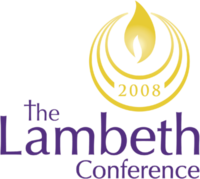Lambeth Conference
| The Lambeth Conference | |
|---|---|

The 2008 Lambeth Conference logo
|
The Lambeth Conference is a decennial assembly of bishops of the Anglican Communion convened by the Archbishop of Canterbury. The first such conference took place in 1867.
As the Anglican Communion is an international association of autonomous national and regional churches and not a governing body, the Lambeth Conferences serve a collaborative and consultative function, expressing "the mind of the communion" on issues of the day. Resolutions which a Lambeth Conference may pass are without legal effect, but they are nonetheless influential.
These conferences form one of the communion's four "Instruments of Communion".
The idea of these meetings was first suggested in a letter to the Archbishop of Canterbury by Bishop John Henry Hopkins of Vermont in 1851. The possibility of such an international gathering of bishops had first emerged during the jubilee of the Church Missionary Society in 1851 when a number of US bishops were present in London. However, the initial impetus came from episcopal churches in Canada. In 1865 the synod of that province, in an urgent letter to the Archbishop of Canterbury, (Charles Thomas Longley), represented the unsettlement of members of the Canadian church caused by recent legal decisions of the Privy Council and their alarm lest the revived action of convocation "should leave us governed by canons different from those in force in England and Ireland, and thus cause us to drift into the status of an independent branch of the Catholic Church". They therefore requested him to call a "national synod of the bishops of the Anglican Church at home and abroad", to meet under his leadership. After consulting both houses of the Convocation of Canterbury, Archbishop Longley assented and convened all the bishops of the Anglican Communion (then 144 in number) to meet at Lambeth in 1867.
Many Anglican bishops (amongst them the Archbishop of York and most of his suffragans) felt so doubtful as to the wisdom of such an assembly that they refused to attend it, and Dean Stanley declined to allow Westminster Abbey to be used for the closing service, giving as his reasons the partial character of the assembly, uncertainty as to the effect of its measures and "the presence of prelates not belonging to our Church".
...
Wikipedia
